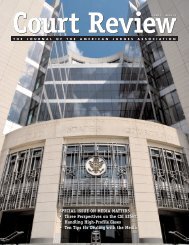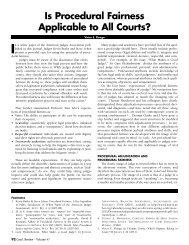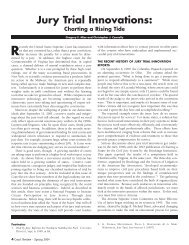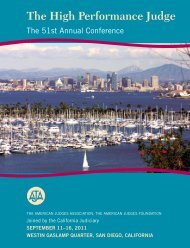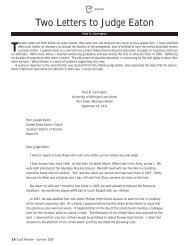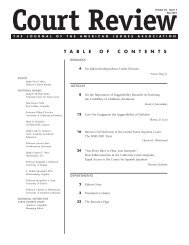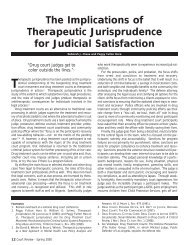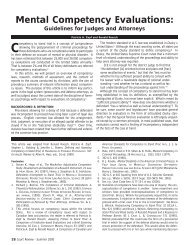Special Issue on Procedural Fairness - American Judges Association
Special Issue on Procedural Fairness - American Judges Association
Special Issue on Procedural Fairness - American Judges Association
- No tags were found...
Create successful ePaper yourself
Turn your PDF publications into a flip-book with our unique Google optimized e-Paper software.
nomen<strong>on</strong> exists. 6 Thus, procedural fairness is a critical part of understanding how thepublic interprets their experience with the court system and translates that experienceinto a subjective valuati<strong>on</strong> of the court system as whole.Citizens have high expectati<strong>on</strong>s for how they will be treated during their encounters withthe judicial system. In particular, they focus <strong>on</strong> the principles of procedural fairnessbecause “people view fair procedures as a mechanism through which to obtain equitableoutcomes—which is the goal in cases of c<strong>on</strong>flict of interest.” 7 People value fair proceduresbecause they are perceived to “produce fair outcomes.” 8Psychology professor Tom Tyler, a leading researcher in this area, suggests that there arefour basic expectati<strong>on</strong>s 9 that encompass procedural fairness:• Voice: the ability to participate in the case by expressing their viewpoint;• Neutrality: c<strong>on</strong>sistently applied legal principles, unbiased decisi<strong>on</strong> makers,and a “transparency” about how decisi<strong>on</strong>s are made;• Respectful treatment: individuals are treated with dignity and their rights areobviously protected;• Trustworthy authorities: authorities are benevolent, caring, and sincerely tryingto help the litigants—this trust is garnered by listening to individuals and byexplaining or justifying decisi<strong>on</strong>s that address the litigants’ needs. 10<strong>Procedural</strong> fairness matters to every litigant who appears before a judge, but “[w]hat isstriking about procedural justice judgments is that they also shape the reacti<strong>on</strong>s of thosewho are <strong>on</strong> the losing side.” 11 People are in fact more willing to accept a negative outcomein their case if they feel that the decisi<strong>on</strong> was arrived at through a fair method.Significantly, even a judge who scrupulously respects the rights of litigants may n<strong>on</strong>ethelessbe perceived as unfair if he or she does not meet these expectati<strong>on</strong>s for proceduralfairness.Of course, this does not mean that people are happy if they lose their case and fail toobtain the outcomes they desire. It does mean, however, that they are more willing toaccept and abide by the decisi<strong>on</strong>s of judges when those decisi<strong>on</strong>s seem to have been madefairly. And their views of judges, the court system, and the law are more favorable followingan experience in which their case is handled via a fair procedure.6. Tom R. Tyler, Psychological Models of the Justice Motive:Antecedents of Distributive and <strong>Procedural</strong> Justice, 67 J. PERS. SOC.PSYCHOL. 850-863 (1994); Tom R. Tyler, The Relati<strong>on</strong>ship of theOutcome and <strong>Procedural</strong> <strong>Fairness</strong>: How Does Knowing the OutcomeInfluence Judgments about the Procedure?,9 SOC. JUSTICE RES. 311-325 (1996); Larry Heuer, et al., The Generality of <strong>Procedural</strong> JusticeC<strong>on</strong>cerns: A Deservedness Model of Group Value and Self-interestBased <strong>Fairness</strong> C<strong>on</strong>cerns, 25 PERS. SOC. PSYCHOL. BULL. 1279-1292(1999); J. Greenburg, Determinants of Perceived <strong>Fairness</strong> ofPerformance Evaluati<strong>on</strong>s, 71 J. APPL. PSYCHOL. 340-342 (1986); J.Greenberg, Looking Fair Versus Being Fair: Managing Impressi<strong>on</strong>s ofOrganizati<strong>on</strong>al Justice, 12 RESEARCH IN ORGANIZATIONAL BEHAVIOR111-157 (B. Staw & L. Cummings eds.1990); J. Greenberg & R.Folger, <strong>Procedural</strong> Justice, Participati<strong>on</strong>, and the Fair Process Effectin Groups and Organizati<strong>on</strong>s, BASIC GROUP PROCESSES 235-256 (P. B.Paulus ed. 1983); E. A. LIND, & TOM R. TYLER, THE SOCIAL PSY-CHOLOGY OF PROCEDURAL JUSTICE, (1988); J. THIBAUT & J. WALKER,PROCEDURAL JUSTICE: A PSYCHOLOGICAL ANALYSIS (1975); K. Van denBos, et al., Sometimes Unfair Procedures Have Nice Aspects: On thePsychology of the Fair Process Effect, 77 J. PERSONALITY & SOCIALPSYCHOL. 324-336 (1999); K. Van den Bos, et al., EvaluatingOutcomes by means of the Fair Process Effect: Evidence for DifferentProcesses in <strong>Fairness</strong> and Satisfacti<strong>on</strong> Judgments, 74 J. PERSONALITY& SOCIAL PSYCHOL. 1493-1503 (1998).7. Tyler, et al., supra note 3, at 75.8. MacCoun, supra note 2, at 12.9. WHY PEOPLE OBEY, supra note 5, at 23.10. Id. at 22-23. See also David B. Rottman, Adhere to <strong>Procedural</strong><strong>Fairness</strong> Principles Throughout the Justice System, 6 CRIM. & PUB.POL’Y 835, 835 (2007).11. WHY PEOPLE OBEY, supra note 5, at 23.6 Court Review - Volume 44



